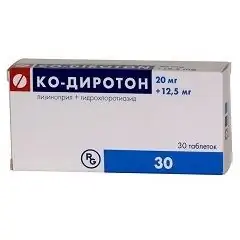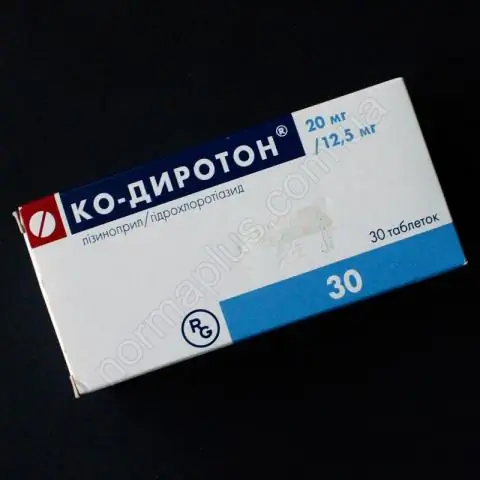- Author Rachel Wainwright wainwright@abchealthonline.com.
- Public 2023-12-15 07:39.
- Last modified 2025-11-02 20:14.
Ko-Diroton
Ko-Diroton: instructions for use and reviews
- 1. Release form and composition
- 2. Pharmacological properties
- 3. Indications for use
- 4. Contraindications
- 5. Method of application and dosage
- 6. Side effects
- 7. Overdose
- 8. Special instructions
- 9. Application during pregnancy and lactation
- 10. Use in childhood
- 11. In case of impaired renal function
- 12. For violations of liver function
- 13. Use in the elderly
- 14. Drug interactions
- 15. Analogs
- 16. Terms and conditions of storage
- 17. Terms of dispensing from pharmacies
- 18. Reviews
- 19. Price in pharmacies
Latin name: Co-Diroton
ATX code: C09BA03
Active ingredient: Lisinopril + Hydrochlorothiazide (Lisinopril + Hydrochlorothiazide)
Producer: Gedeon Richter (Hungary), Grodzisk Pharmaceutical Works Polfa Co. (Poland), Gedeon Richter Poland, Co. Ltd. (Poland)
Description and photo update: 2018-27-07
Prices in pharmacies: from 352 rubles.
Buy

Co-Diroton is a combined drug with a diuretic, hypotensive effect, used in the treatment of arterial hypertension.
Release form and composition
Dosage form of release of Ko-Diroton - tablets: round flat-cylindrical shape, with a chamfer; 10 mg + 12.5 mg - light blue, a few inclusions of a darker color are possible, engraving on one side "C43"; 20 mg + 12.5 mg - light green, a few inclusions of a darker color are possible, engraving on one side "C44" (in a cardboard box 1 or 3 blisters of 10 pcs. In each).
Active ingredients in 1 tablet:
- lisinopril - 10 or 20 mg (lisinopril dihydrate - 10.89 or 21.77 mg);
- hydrochlorothiazide - 12.5 mg.
Additional components (10 mg + 12.5 mg / 20 mg + 12.5 mg): magnesium stearate - 5/5 mg; mannitol - 50/50 mg; aluminum varnish based on indigotine dye (E 132) - 0.2 / 0.2 mg; dye iron oxide yellow (E 172) - 0 / 0.1 mg; partially pregelatinized starch - 2.25 / 2.25 mg; calcium hydrogen phosphate dihydrate - 136.8 / 136.7 mg; pregelatinized starch - 2.25 / 2.25 mg; corn starch - 31/31 mg.
Pharmacological properties
Pharmacodynamics
Co-Diroton is one of the combined drugs that have a diuretic and antihypertensive effect.
Lisinopril
It is an ACE (angiotensin converting enzyme) inhibitor, its action is aimed at reducing the formation of angiotensin II from angiotensin I, which, in turn, reduces the release of aldosterone.
It helps to reduce the degradation of bradykinin and increase the synthesis of prostaglandins. Reduces OPSS (total peripheral vascular resistance), blood pressure (blood pressure), pressure in the pulmonary capillaries, preload. Against the background of chronic heart failure, taking Co-Diroton leads to an increase in the minute blood volume and an increase in exercise tolerance.
Lisinopril improves the blood supply to the ischemic myocardium. The expansion of the arteries occurs to a greater extent than the veins. Some of the effects can be attributed to the effect on tissue renin-angiotensin systems. Conducting a long course allows you to reduce the severity of myocardial hypertrophy and resistive arterial walls.
ACE inhibitors contribute to lengthening life expectancy in patients with chronic heart failure, slowing the progression of left ventricular dysfunction in patients who have suffered myocardial infarction, which was not accompanied by clinical manifestations of heart failure.
The development of the antihypertensive effect of Co-Diroton begins after about 6 hours, lasts 24 hours. The duration of the therapeutic effect is also determined by the dose. The onset of action of lisinopril is after 1 hour, the maximum effect is observed after 6-7 hours. The effect of the substance in arterial hypertension is observed in the first days after the start of administration, the development of a stable effect after 1-2 months.
A pronounced increase in blood pressure with a sharp cancellation of Co-Diroton is not observed.
In addition to lowering blood pressure, lisinopril helps to reduce albuminuria. In patients with hyperglycemia, it leads to the normalization of the function of the damaged glomerular endothelium.
Lisinopril has no effect on blood glucose levels in patients with diabetes mellitus. An increase in cases of hypoglycemia is not observed.
Hydrochlorothiazide
It is a thiazide diuretic. Its action is associated with impaired reabsorption of ions of potassium, chlorine, sodium, magnesium, water in the distal nephron; delays the excretion of uric acid, calcium ions. The antihypertensive effect is due to the expansion of arterioles. The normal level of blood pressure is practically not affected.
The development of a diuretic effect is observed after 1-2 hours, the maximum level is reached after 4 hours and lasts for 6-12 hours. The antihypertensive effect occurs in 3-4 days; some patients require 3-4 weeks to achieve optimal therapeutic effect.
Pharmacokinetics
Lisinopril
After oral administration, C max (maximum concentration) of lisinopril in blood serum is reached after 7 hours. The substance binds weakly to plasma proteins.
Average absorption is approximately 25%, with significant interindividual variability (6-60%). Food does not affect the absorption of the substance.
Lisinopril is not metabolized and is excreted by the kidneys unchanged. After repeated administration of the drug, the effective T 1/2 (half-life) is 12 hours. In patients with impaired renal function, the excretion of the substance is slowed down, but this is of clinical significance only in cases where the glomerular filtration rate is <30 ml / min.
In elderly patients compared with younger patients, the level of C max and AUC (area under the concentration-time curve) is, on average, two times higher. Lisinopril is excreted from the body by hemodialysis.
It crosses the blood-brain barrier to a small extent.
Hydrochlorothiazide
The substance is not metabolized, it is rapidly excreted by the kidneys. T 1/2 is in the range of 5.6-14.8 hours. At least 61% of the dose is excreted unchanged within 24 hours.
Hydrochlorothiazide does not penetrate the blood-brain barrier, but penetrates the placental barrier.
Indications for use
Co-Diroton is prescribed for arterial hypertension in patients for whom combination therapy is indicated.
Contraindications
Absolute:
- angioedema, including a history of Quincke's edema associated with the use of ACE inhibitors;
- anuria;
- severe renal failure (in patients with creatinine clearance <30 ml / min);
- hypercalcemia;
- hemodialysis, which uses high-flow membranes;
- porphyria;
- hyponatremia;
- hepatic coma;
- precom;
- severe diabetes mellitus;
- age up to 18 years;
- individual intolerance to any component of the drug, as well as other ACE inhibitors.
Relative (Ko-Diroton is prescribed under medical supervision):
- arterial hypotension;
- liver failure;
- primary hyperaldosteronism;
- renal failure (in patients with creatinine clearance> 30 ml / min);
- aortic stenosis / hypertrophic cardiomyopathy;
- condition after kidney transplantation;
- stenosis of an artery of a solitary kidney with progressive azotemia;
- bilateral renal artery stenosis;
- bone marrow hypoplasia;
- hyponatremia (due to an increased risk of arterial hypotension in patients on a low or salt-free diet);
- coronary heart disease;
- hypovolemic conditions, including vomiting and diarrhea;
- hyperkalemia;
- connective tissue diseases, including systemic lupus erythematosus, scleroderma;
- hyperuricemia;
- diabetes;
- oppression of bone marrow hematopoiesis;
- gout;
- cerebrovascular disease, including cerebrovascular accident;
- chronic heart failure in severe course;
- elderly age.
Instructions for the use of Ko-Diroton: method and dosage
Co-Diroton is taken orally.
Usually 1 tablet is prescribed once a day. If the proper therapeutic effect is not achieved within 2-4 weeks, a single dose can be doubled.
In patients with creatinine clearance of 30-80 ml / min, Co-Diroton can be used only after individual selection of the dose of individual active components.
In uncomplicated renal failure, the recommended starting dose of lisinopril is 5-10 mg.
After taking the initial dose of the drug, the development of symptomatic arterial hypotension may occur. These cases are more common in patients with fluid and electrolyte loss associated with prior diuretic treatment. In this regard, 2-3 days before the start of the use of Co-Diroton, diuretics should be discontinued.
Side effects
Most often, during the period of therapy, the development of dizziness and headache is observed.
Possible violations:
- digestive system: changes in taste, vomiting, nausea, abdominal pain, dry mouth, diarrhea, anorexia, dyspepsia, pancreatitis, cholestatic / hepatocellular hepatitis, jaundice;
- cardiovascular system: marked decrease in blood pressure, chest pain; rarely - myocardial infarction, impaired AV conduction, orthostatic hypotension, bradycardia, tachycardia, symptoms of heart failure;
- central nervous system: increased fatigue, mood lability, impaired concentration, paresthesia, drowsiness, convulsive twitching of the muscles of the lips and limbs; rarely - confusion, asthenic syndrome;
- skin: urticaria, photosensitivity, increased sweating, pruritus, alopecia;
- hematopoietic system: agranulocytosis, leukopenia, neutropenia, thrombocytopenia, anemia (decrease in the concentration of hematocrit, hemoglobin, erythrocytopenia);
- respiratory system: bronchospasm, dry cough, dyspnea, apnea;
- genitourinary system: decreased potency, uremia, oliguria and / or anuria, acute renal failure, impaired renal function;
- laboratory parameters: hypo- or hyperkalemia, hypomagnesemia, hyponatremia, hypercalcemia, hypochloremia, hyperuricemia, hyperglycemia, increased levels of urea and creatinine in blood plasma, hypercholesterolemia, hyperbilirubinemia, hypertriglyceridemia, decreased tolerance to hepatic transients, increased activity a history of kidney disease, renovascular hypertension, and diabetes mellitus;
- allergic reactions: angioedema of the tongue, face, lips, extremities, larynx and / or epiglottis, vasculitis, skin rashes, fever, itching, positive reactions to antinuclear antibodies, eosinophilia, increased ESR;
- others: exacerbation of gout, myalgia, arthralgia, arthritis, fetal malformation, fever.
Overdose
The main symptoms: drowsiness, xerostomia, marked decrease in blood pressure, urinary retention, irritability, anxiety, constipation.
In case of an overdose, symptomatic treatment, intravenous fluid administration, and blood pressure control are indicated. Correction of disturbances in water-salt balance and dehydration under the control of urea, electrolytes and creatinine in blood serum and urine output is also required.
special instructions
The most pronounced decrease in blood pressure is observed with a decrease in fluid volume caused by the use of diuretics, a decrease in the amount of salt in food, dialysis, and diarrhea or vomiting.
In patients with chronic heart failure, proceeding with / without renal failure, a pronounced decrease in blood pressure is possible. More often it is detected in patients with a severe class of chronic heart failure as a consequence of the use of diuretics in high doses, hyponatremia, or impaired renal function. Treatment in such patients should begin under strict medical supervision. Similar recommendations must be followed in cases of prescribing Co-Diroton to patients with ischemic heart disease, cerebrovascular insufficiency, since a sharp decrease in blood pressure in them can cause myocardial infarction or stroke.
Transient arterial hypotension is not a contraindication for further therapy.
Before taking Co-Diroton, if possible, it is necessary to normalize the sodium concentration and / or replenish the lost volume of fluid. A careful monitoring of the effect of the initial dose of the drug on the patient's condition is shown.
In chronic heart failure, a pronounced decrease in blood pressure after starting therapy with ACE inhibitors can lead to further deterioration of renal function. There is evidence of cases of acute renal failure.
During the use of ACE inhibitors in patients with bilateral renal artery stenosis or stenosis of an artery of a single kidney, an increase in serum urea and creatinine was observed, usually of a reversible nature. More often this violation occurs in patients with renal failure.
Angioneurotic edema of the tongue, face, lips, extremities, larynx and / or epiglottis when using Co-Diroton is rare, but it can develop during any period of therapy. In such cases, the drug should be canceled as early as possible and careful monitoring of the patient's condition should be established.
If the swelling only spreads to the face and lips, the condition usually goes away without additional treatment, but antihistamines may be prescribed. With laryngeal edema, death is possible. When the tongue, larynx or epiglottis are involved in the process, airway obstruction may occur, and therefore requires immediate appropriate therapy (epinephrine solution 1: 1000 subcutaneously in a volume of 0.3-0.5 ml) and / or measures to ensure airway patency.
With a burdened history of angioedema not associated with previous treatment with ACE inhibitors, the risk of its development while taking Co-Diroton is assessed as increased.
In the differential diagnosis of a dry, prolonged cough, it is necessary to take into account the likelihood of a connection with lisinopril.
Lisinopril during major surgery / general anesthesia can block the formation of angiotensin II. A pronounced decrease in blood pressure, which is considered a consequence of this mechanism, is eliminated by an increase in the volume of circulating blood.
Anaphylactic reaction is possible during hemodialysis with high permeability dialysis membranes (AN69). In such cases, consideration should be given to using a different antihypertensive agent or a different type of dialysis membrane.
Before surgical intervention (including dentistry), the anesthesiologist should be warned about taking Co-Diroton.
In a number of cases, the development of hyperkalemia was noted. The main risk factors include diabetes mellitus, renal failure, potassium supplements or drugs that increase the concentration of potassium in the blood (in particular, heparin), especially with impaired renal function.
If there is a risk of symptomatic hypotension (adherence to a low-salt / salt-free diet) with / without hyponatremia, as well as in patients who received high-dose diuretics, the above conditions (loss of fluid and salts) should be compensated before starting treatment.
Thiazide diuretics can affect glucose tolerance, and therefore the dose of hypoglycemic agents for oral administration must be adjusted. With the use of thiazide diuretics, it is possible to reduce the excretion of calcium by the kidneys, causing hypercalcemia. Severe hypercalcemia may indicate latent hyperparathyroidism. Before the test to assess the function of the parathyroid glands, the use of Co-Diroton is recommended to be discontinued.
Because of the risk of dehydration and excessive lowering of blood pressure associated with a decrease in circulating blood volume, in hot weather, as well as when performing exercise, patients should be careful.
During the period of therapy, regular monitoring of urea, lipids, glucose, potassium in blood plasma is required.
It is not recommended to consume alcoholic beverages during the treatment period, as this can lead to an increase in the hypotensive effect of Co-Diroton.
Influence on the ability to drive vehicles and complex mechanisms
Due to the possibility of developing dizziness, it is recommended to refuse to drive vehicles, especially at the beginning of the course.
Application during pregnancy and lactation
According to the instructions, Ko-Diroton is not prescribed during pregnancy / lactation.
When pregnancy is established, the drug should be canceled as early as possible. In the II-III trimesters, taking lisinopril adversely affects the fetus (possible hypoplasia of the skull bones, renal failure, a marked decrease in blood pressure, hyperkalemia, intrauterine death). Information about the negative effect of Co-Diroton on the fetus in the case of its use in the first trimester is not presented. The condition of newborns / infants who have been exposed to intrauterine exposure to lisinopril should be assessed by a doctor in order to timely detect violations (in the form of hyperkalemia, oliguria, a pronounced decrease in blood pressure).
Childhood use
Co-Diroton is not prescribed to patients under 18 years of age, since its effectiveness and safety in this category of patients have not been established.
With impaired renal function
- severe renal failure (in patients with creatinine clearance <30 ml / min), conditions after renal transplantation: therapy is contraindicated;
- renal failure (in patients with creatinine clearance> 30 ml / min): Co-Diroton is prescribed under medical supervision.
For violations of liver function
In liver failure, therapy should be carried out with caution.
Use in the elderly
Co-Diroton can be used under medical supervision.
Drug interactions
Interactions that can be observed with the combined use of Co-Diroton with other drugs / substances:
- vasodilators, barbiturates, phenothiazines, tricyclic antidepressants, ethanol: increased hypotensive effect;
- salicylates: increasing their neurotoxicity;
- quinidine: reducing its excretion;
- peripheral muscle relaxants: enhancing their action;
- methyldopa: increased risk of hemolysis;
- potassium-sparing diuretics, potassium-containing salt substitutes, potassium preparations: an increase in the likelihood of hyperkalemia, especially in the presence of impaired renal function (the combination can only be used as directed by a doctor under regular monitoring of renal function and serum potassium levels in the blood);
- antacids and cholestyramine: reducing their absorption in the gastrointestinal tract;
- cardiac glycosides: enhancement of their therapeutic / side effects;
- non-steroidal anti-inflammatory drugs (indomethacin and others), estrogens: decrease in the antihypertensive effect of Co-Diroton;
- lithium preparations: slowing down the elimination of lithium from the body and enhancing its neurotoxic / cardiotoxic effect;
- drugs with anti-gout action, norepinephrine, epinephrine, oral hypoglycemic drugs: weakening their action;
- oral contraceptives: decrease in their effectiveness.
Analogs
Analogs of Ko-Diroton are: Rileis-Sanovel plus, Lisinopril N STADA, Lizoretic, Lisinoton N, Skopril plus.
Terms and conditions of storage
Keep out of the reach of children at a temperature not exceeding 30 ° C.
The shelf life is 3 years.
Terms of dispensing from pharmacies
Dispensed by prescription.
Reviews about Ko Diroton
According to reviews, Ko-Diroton effectively lowers blood pressure, and also has a diuretic effect. Of the shortcomings, the development of side effects is most often noted.
The price of Ko-Diroton in pharmacies
The approximate price for Ko-Diroton (10 or 30 tablets per pack) is:
- 10 mg + 12.5 mg: 131-240 or 335-450 rubles;
- 20 mg + 12.5 mg: 185-265 or 562-640 rubles.
Ko Diroton: prices in online pharmacies
|
Drug name Price Pharmacy |
|
Co-Diroton 12.5 mg + 10 mg tablets 30 pcs. 352 r Buy |
|
KO-Diroton tablets 10mg + 12.5mg 30 pcs. 444 r Buy |
|
Co-Diroton 12.5 mg + 20 mg tablets 30 pcs. 568 r Buy |
|
KO-Diroton tablets 20mg + 12.5mg 30 pcs. 676 r Buy |

Anna Kozlova Medical journalist About the author
Education: Rostov State Medical University, specialty "General Medicine".
Information about the drug is generalized, provided for informational purposes and does not replace the official instructions. Self-medication is hazardous to health!






